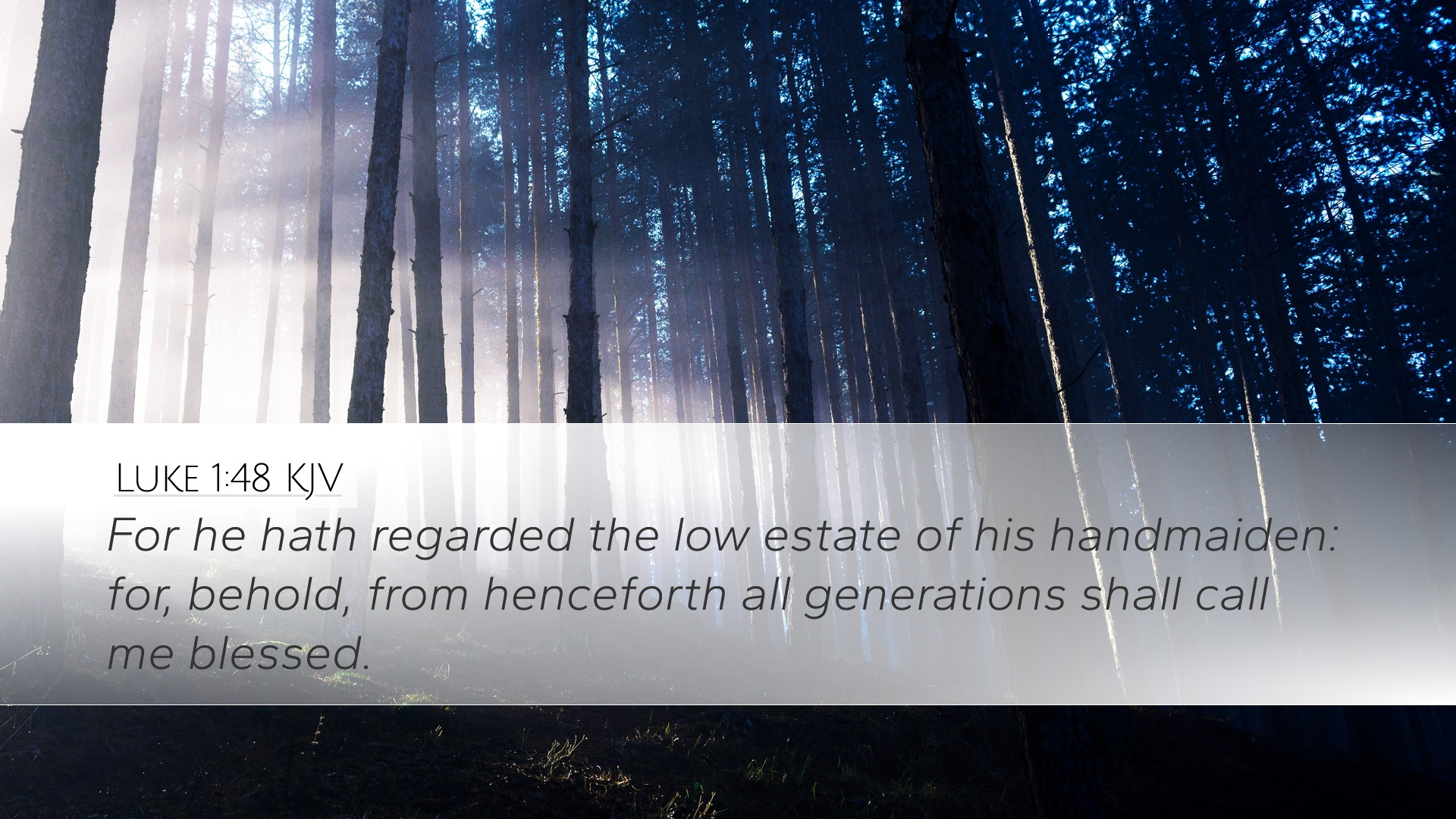Commentary on Luke 1:48
Scripture Reference: Luke 1:48 (KJV) - "For he hath regarded the low estate of his handmaiden: for behold, from henceforth all generations shall call me blessed."
Introduction
The verse of Luke 1:48 is part of Mary’s Magnificat, a song of praise that celebrates God's mercy and faithfulness. In this model of devotion, Mary acknowledges her humble status and God’s favor upon her. Each phrase resonates with theological significance and provides insights into themes of humility, divine grace, and the universal recognition of God's work through her.
Overview of Public Domain Commentaries
This commentary synthesizes perspectives from Matthew Henry, Albert Barnes, and Adam Clarke, emphasizing the richness of Mary’s words as they apply to both the historical context and their enduring theological implications.
Theological Themes
- Humility: Mary identifies herself as a "handmaiden," a term signifying service and lowliness. Matthew Henry notes that her humility is a key characteristic that positions her for God’s grace. It serves as a reminder that God often chooses the lowly and humble for His purposes.
- God's Attention to the Marginalized: The phrase "he hath regarded the low estate" indicates God's concern for those of humble and lowly positions. Albert Barnes emphasizes that God values humility and often chooses the weak and despised to accomplish His plans.
- The Universal Call to Blessedness: "From henceforth all generations shall call me blessed" highlights Mary’s unique role in salvation history. Adam Clarke explains that this acknowledgment extends beyond her time, pointing to the recognition of Mary in the broader narrative of Christ’s redemption.
Exegesis of Key Phrases
Analyzing Mary’s expression offers deeper insights:
- "He hath regarded": The Hebrew connotation of 'to regard' indicates a deliberate, intentional act of recognizing and taking notice. Matthew Henry compares this attentiveness to God's response to the cries of His people throughout biblical history.
- "The low estate of his handmaiden": Handmaiden signifies servitude and humility. It parallels the biblical theme of God’s favor toward those of low status, as seen in many Old Testament figures like David and the prophets. Barnes affirms that this reflects God’s divine preference for humility over worldly might.
- "From henceforth all generations shall call me blessed": This prophetic declaration not only anticipates Mary's role but also underscores the timelessness of God’s grace. Clarke asserts that this beatitude offers a theological blueprint for understanding Mary's significance in the faith community through successive generations.
Mary’s Role in Salvation History
Mary’s response is pivotal for understanding her place in the redemptive narrative. Matthew Henry posits that her humility aligns with God’s plan, wherein the lowly serve as vessels for divine action. This reflects a recurring biblical motif: God uses the meek and lowly to confound the wise.
Furthermore, God choosing Mary emphasizes the theme of incarnation—God coming to humanity in a simple and unassuming manner. Barnes highlights that by choosing a humble servant, God demonstrates His spirit of grace that uplifts the lowly and transforms them into instruments of His will.
Application for Believers Today
The implications of Luke 1:48 resonate profoundly with contemporary believers. Mary exemplifies the ideal response to divine calling: an acknowledgment of one’s humble state coupled with unwavering faith in God’s plan.
- Embrace of Humility: Believers are encouraged to approach God with humility, recognizing their dependence on His grace, just as Mary did.
- Celebration of God’s Work: The recognition of God's works in the lives of the humble serves as a model for worship and gratitude in the Christian life. Every testimony of God's intervention reflects the promise of blessing for those who trust and serve Him.
- Universal Outreach: The phrase "all generations" invites believers to engage in a broader mission, proclaiming the Gospel across diverse cultures and generations, fulfilling the call to make disciples of all nations.
Conclusion
Luke 1:48 invites believers to meditate on the profound and multifaceted implications of Mary’s praise. Through her acknowledgment of God's regard for the humble, we find a call to humility, a declaration of blessing, and an invitation to participate in the unfolding story of redemption. The commentaries of Henry, Barnes, and Clarke collectively enrich our understanding of this significant passage, providing both historical context and relevant application for today's faithful.


